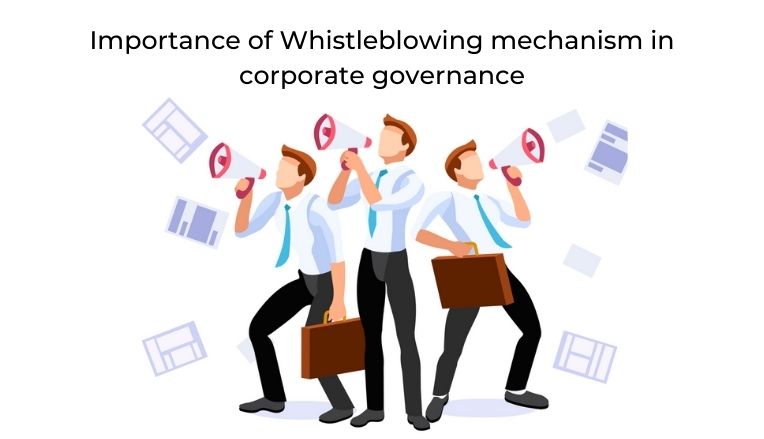- +91 9910687775
- contact@whistlefirst.com

21 Nov 2022
What is Whistleblowing?
Whistleblowing means the act of disclosing certain types of practices within an organisation. Any misconduct disclosed by a Whistle-blower must be in the public interest and thus must impact others, for example, the general public.
Corporate governance and whistle blowing
"Citizens never support a weak company, and birds do not build nests on the fruitless tree." These lines of Chanakya from 'ArthaSastra' emphasise the importance of good corporate governance. To grasp the idea of whistleblowing in regards to corporate governance, the concepts "governance" and "corporate governance" must be understood. The word "governance" comes from "gubernare" in Latin, meaning to rule or guide. In Simple words governance means the "guiding" of an organisation in the right way.
Corporate governance is more than just corporate management; it is a much wider concept that includes an equitable, effective, and accountable administration to achieve well-defined goals. It is a mechanism for structuring, managing, and regulating a business to satisfy owners, creditors, employees, consumers, and vendors while complying with legal and regulatory requirements and fulfilling environmental and local community needs.
When practiced in a well-defined structure, it contributes to the formation of a legal, commercial, and organizational framework, as well as the delineation of the limits under which these functions are carried out.
Whistleblowing is an act that not only aids in exposing companies' illicit practices to the media but also allows employers to discover and resolve corporate irregularities before they can occur. Corporate governance may be described as a set of processes or a mechanism that businesses establish to control business operations, make firm policies, and accomplish goals more efficiently and successfully.
Vital Role of Whistleblowing in Corporate Governance
Companies Act, 2013, and Companies (Meetings of Board and its Powers) Rules, 2014
The Companies Act of 2013, enacted in the wake of several business controversies, removes loopholes by mandating tighter enforcement and transparency norms than the previously enforced legislations. The introduction of the Companies Act, 2013, is a move toward better corporate governance.
The Companies Act of 2013 does not use the word "whistleblowing," but the rules are based on the definition. The Companies Act contains a specific chapter (Chapter XIV) titled "Inspection, Inquiry, and Investigation" that deals with the different facets of the concept of whistleblowing. Sections 206 to 229 of the Companies Act provide a new method for inspecting, inquiring and investigating company affairs. Section 211 of the Companies Act mandates the appointment of a Serious Fraud Investigation Officer (SFIO). According to the Companies Act of 2013, whistleblowing is not only a voluntary act of the individual choosing to do so, but it is also the person's obligation, right, and liability to assist in business affairs.
For more details about the overview of legal regime in India please visit our page Legal Regime of whistleblowing in India
Provide unique insights to stakeholders
The corporate governance system in large and small businesses typically consists of a supervisory committee, a board committee, a framework for risk management, an internal compliance framework, and a whistleblowing mechanism. Corporate governance's central goal is to increase shareholder equity and to promote integrity in the interests of other concerned shareholders.
It is essential to foster a culture of transparency and effective communication flow in the organisation, as well as the employees who must feel like they can raise concerns related to the activities of the company or other relevant issues without the risk of termination or victimisation. The employees must also be ensured that their concerns are addressed in a fair and transparent manner.
Reveals Inconvenient Truths
Whistleblowing is a core part of defence in companies’ systems of internal control, and it is a strong weapon to root out complacency and inertia. Whistleblowing gives companies a chance to receive direct and raw feedback that is untainted by self-interest and unfiltered by management. Whistleblowing can concern matters that were previously unknown to the company, or it can ensure that the seriousness and extent of a known issue is fully understood. Early intervention is the best form of damage limitation.
Provides trustworthy communication channel within the organisation
In addition, employees must therefore know about whom to communicate or disclose their issues. It is why, transparent communication through the correct channel in a whistleblowing policy is required for every large and small business. As no legal requirements related to whistleblowing needs to be fulfilled, business policies should be sufficient and provide encouragement to the employees.
Conclusion
Good corporate governance practices are a prerequisite for every business which aspire to provide both their shareholders and stakeholders with long-term value. It is necessary as the transparency and satisfaction of shareholders and other stakeholders in a corporation are increased. In an organisation, strong basic principles and ethical actions will help it survive an enormous crisis. Compliance with best practices in corporate governance should not be seen as a legal obligation but rather as the organization's opportunity and benefit.

